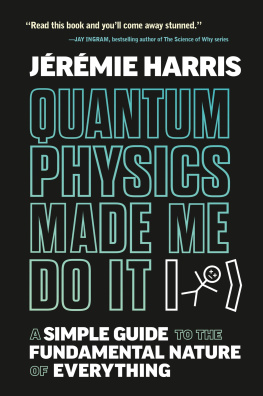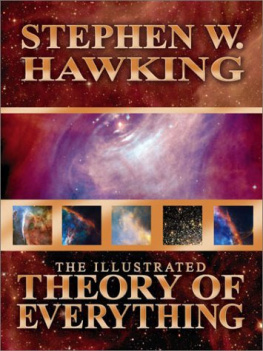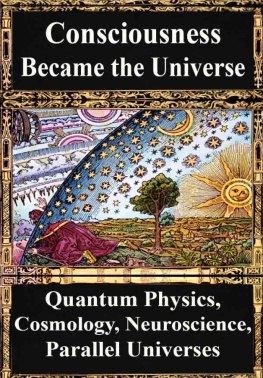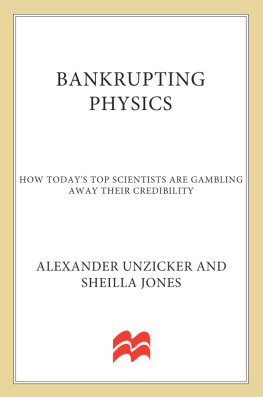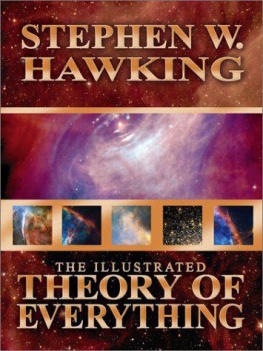The rabbit hole gets wrestled here. An old school saying applies: the more you know, the more you dont know. Dance along this read into the unknown and find out that this book may be the best ever answer to what is soul?
Chuck D, rapper and co-founder of Public Enemy
This book reminds me of Hawkings A Brief History of Timevery brief and very ambitious. It covers an enormous amount of material and offers insights not only into physics but how we do physics and who we are as physicists.
David Spergel, winner of the 2018 Breakthrough Prize in Fundamental Physics
Stephon Alexander has done it again. Fear of a Black Universe opens many dimensionsits an endlessly stimulating, hyper-complex overview by a deeply musical scientist and mathematician. From Public Enemys classic Fear of a Black Planet hip hop album and what happened before the Big Bang to how consciousness itself is woven into the fabric of space-time, this book will blow your mind. A must-read for anyone who thinks of physics and music as being inseparable.
Paul D. Miller aka DJ Spooky
An expansive and poetic account of not just the theory of physics, but the dreamy processes that lead to its creation, and the opposing forces that support and hinder its progress.
Eugenia Cheng, author of x + y
Einstein famously remarked that mystery is the source of all true art and science. This book explores some of the biggest mysteries of alldark matter, dark energy, the origin of the universe, and the origin of lifein ways that are unconventional and enthralling, yet down to earth. We go on a journey with a brave adventurer for whom physics is a passionate pursuit of beauty and truth. His passion shines through on every page.
Edward Frenkel, author of Love and Math
Read this book and youll feel awe at the grandeur and the remaining mysteries of our world, but youll also get a hint of the human side of physics. Science is made of people and is for people; this book revives the humanist project that launched science in the first place.
Jaron Lanier, author of Ten Arguments for Deleting Your Social Media Accounts Right Now
In this courageous and provocative book, Alexander recounts his personal story of overcoming prejudice while offering a hopeful perspective for our future. Discussing the origins of his boldest ideas, from his practice as a professional jazz musician to his explorations of Jungian psychology, is especially inspiring.
Lee Smolin, author of Einsteins Unfinished Revolution
The Jazz of Physics
Copyright 2021 by Stephon Alexander
Cover design by Ann Kirchner
Cover image Chinnapong / Shutterstock.com
Cover copyright 2021 by Hachette Book Group, Inc.
Hachette Book Group supports the right to free expression and the value of copyright. The purpose of copyright is to encourage writers and artists to produce the creative works that enrich our culture.
The scanning, uploading, and distribution of this book without permission is a theft of the authors intellectual property. If you would like permission to use material from the book (other than for review purposes), please contact permissions@hbgusa.com. Thank you for your support of the authors rights.
Basic Books
Hachette Book Group
1290 Avenue of the Americas, New York, NY 10104
www.basicbooks.com
First Edition: August 2021
Published by Basic Books, an imprint of Perseus Books, LLC, a subsidiary of Hachette Book Group, Inc. The Basic Books name and logo is a trademark of the Hachette Book Group.
The Hachette Speakers Bureau provides a wide range of authors for speaking events. To find out more, go to www.hachettespeakersbureau.com or call (866) 376-6591.
The publisher is not responsible for websites (or their content) that are not owned by the publisher.
Images Stephon Alexander except Jiro Soda
Library of Congress Cataloging-in-Publication Data
Names: Alexander, Stephon, author.
Title: Fear of a black universe : an outsiders guide to the future of physics / Stephon Alexander.
Description: First edition. | New York : Basic Books, 2021. | Includes bibliographical references and index.
Identifiers: LCCN 2021001977 | ISBN 9781541699632 (hardcover) | ISBN 9781541699618 (ebook)
Subjects: LCSH: Cosmology. | PhysicsResearchMethodology. | ResearchPhilosophy. | ResearchSocial aspects.
Classification: LCC QB981 .A538 2021 | DDC 523.1dc23
LC record available at https://lccn.loc.gov/2021001977
ISBNs: 978-1-5416-9963-2 (Hardcover); 978-1-5416-9961-8 (Ebook)
E3-20210723-JV-NF-ORI
In loving memory of my grandmothers, Celisha Belfon and Ruby Farley, who taught me how to heal with the imagination.
Into blinding darkness enter
Those who worship ignorance
Into as if still greater darkness
Enter those who delight in knowledge
T HE U PANISHADS
W e physicists have determined that over 95 percent of the matter and energy in the universe is invisible. We have branded this enigmatic stuff dark matter and dark energy; their discovery raised puzzles that shook the foundations of physical law. The gravitational effects of dark matter are observed in large halos surrounding galaxies and are critical to our current conception of how the large-scale arrangement of visible matter in the universe came to be. Likewise, so far, with dark energy, which was discovered with telescopes by measuring the accelerated expansion of the universe, it too has been the province of cosmologists, who have written about it only in reference to extraterrestrial matters and the overall shape and destiny of the universe. This is a mistake. This dark stuff turns out to play a hidden role in the visible world, including in our understanding of life itself. Dark energy resides in all empty space, not just outer space, and permeates all existence. Its quantum effects are present even in the spaces between the very atoms in our bodies. The time has come for a new Newton, to reunite the physics of the extraterrestrial with the physics of the terrestrial. Such an integration might facilitate our understanding of dark matter and dark energy, enabling a better understanding of who we are and of the cosmos in which we live.
Just as the discoveries of dark matter and dark energy shook the foundations of physics, our continued inability to unearth the identity and nature of most of the universe continues to shake them, and, consequently, it limits our understanding of our place in the universe. We still do not know much about the dark sector except that it exists; yet researchers often ascribe properties to dark matter based on presumptions that mimic known physics and are not intrepid enough. It seems to me that methodologies that might enable us to ask new questions, and find new properties or new roles for the dark in our universe, generate fear. Do we dread the dark so much that we project our fears onto the very phenomena about which we are scientifically ignorant?
Dark matter and dark energy are not the only anomalies our current physics doesnt handle. A handful of other deviations from our accepted theories of physics generate speculations that likewise trouble physics. The resolution of these anomalies may shake the foundation of what we presume to be true.
Such anomalies raise a related set of questions, one more apropos for the social sciences than the natural sciences: How does science respond to ideas that might violate our scientific norms and expectations? Does the scientific community fear embracing dark ideas from outsiders, especially if the ideas may not be in a form that the community is comfortable with, if they do not fit seamlessly into our theories and expected practices?


